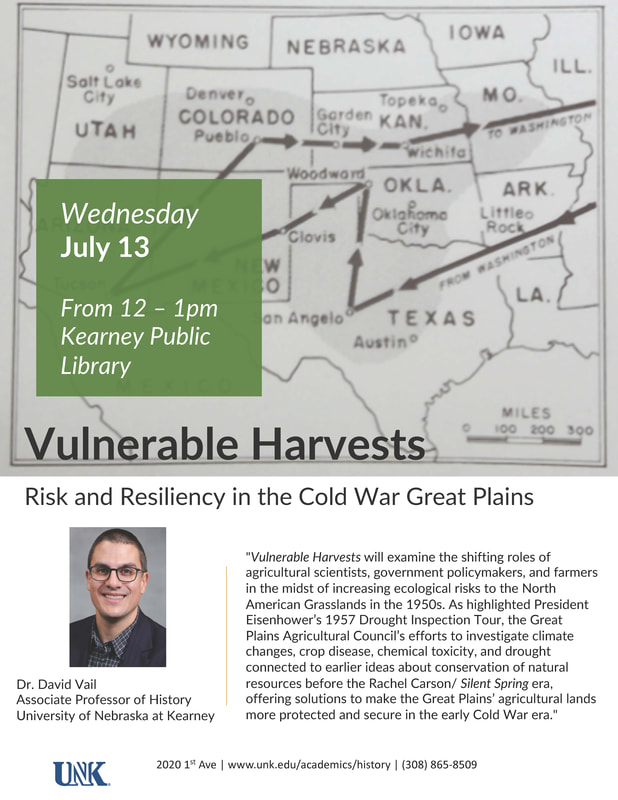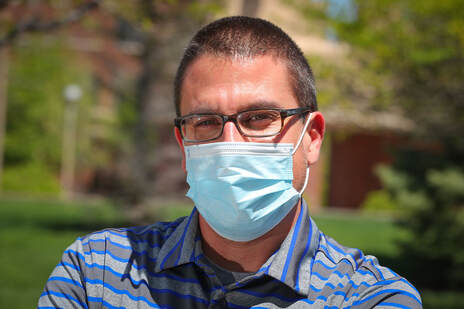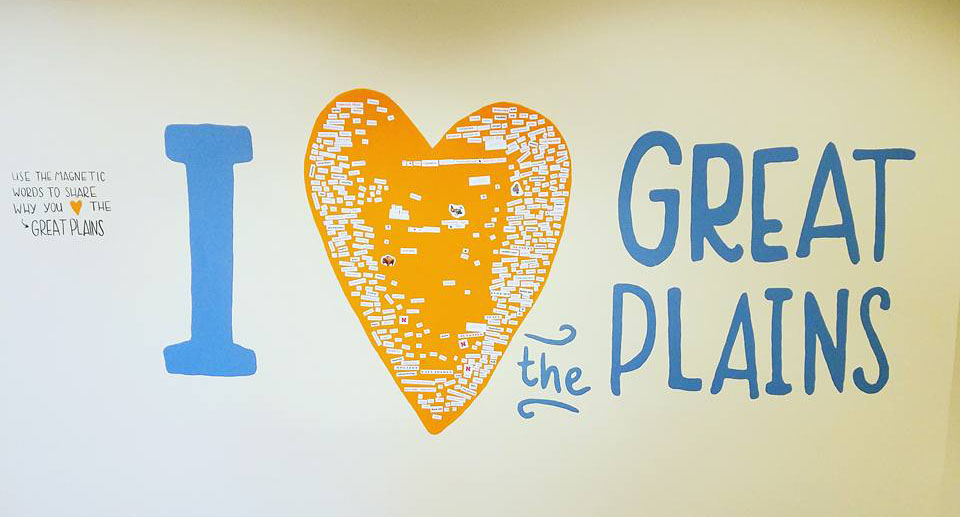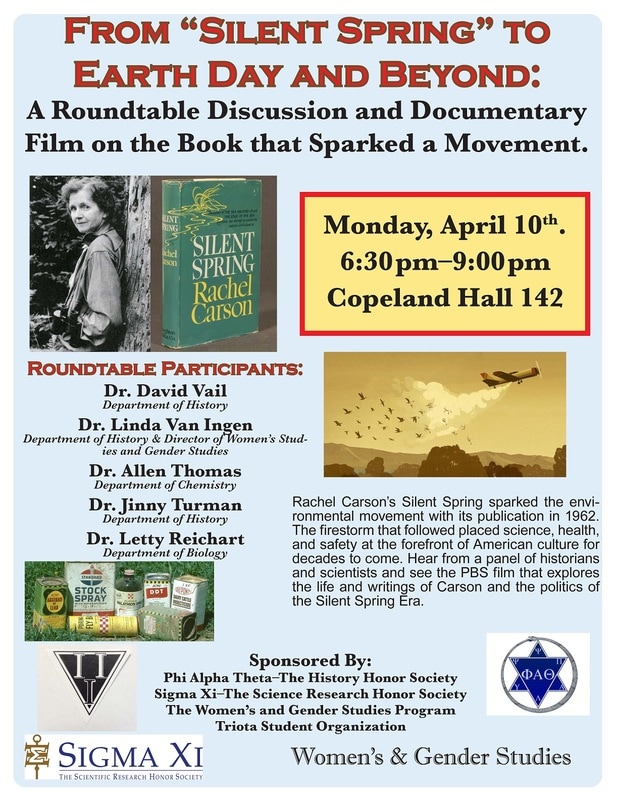 December 8, 2023 Tyler Ellyson UNK News KEARNEY – The University of Nebraska at Kearney has named associate professor of history David Vail as the inaugural recipient of the Excellence in Teaching General Studies Award. The award is presented by the UNK General Studies Council and given to a faculty member in recognition of outstanding dedication to teaching general studies courses and helping students accomplish their academic and career goals. Vail is credited for motivating students to engage in undergraduate research, community service and social involvement. His teaching range is extensive, covering subjects such as the History of Science and Medicine, American History and the History of Global Public Health, as well as numerous graduate classes. A first-generation faculty member and part of UNK’s First-Gen Leadership Team, Vail is deeply invested in the success of first-generation students, providing necessary support and mentorship. Additionally, he serves on the board of Humanities Nebraska and assists with programming for the University of Nebraska-Lincoln’s Center for Great Plains Studies. “Dr. Vail brings passion to his classroom, where he helps students see beyond what is covered in the course material to gain an appreciation for many different fields of study,” said Greg Brown, director of general studies. “Dr. Vail is also extremely student-centered, helping his students to feel not only welcome but wanted in the class.” All nominations for the award came from students, and a selection committee made up of students picked the winner. “Dr. Vail is one of those teachers who makes learning fun. He brings a very creative energy to his classroom. He is always there to answer our questions and make us feel heard,” UNK student Miranda Niemeyer said in her nomination video. UNK student Katie Cornelio said Vail has made a profound difference in her life. “The best educators in this world don’t stop educating their students just inside the classroom. They push for an external influence. Dr. Vail has inspired me to do undergrad research,” said Cornelio. “Dr. Vail calls his students colleagues, and that has a very powerful meaning. He makes his students feel as if they truly belong in the classroom and that we are working together toward a future goal.”
0 Comments
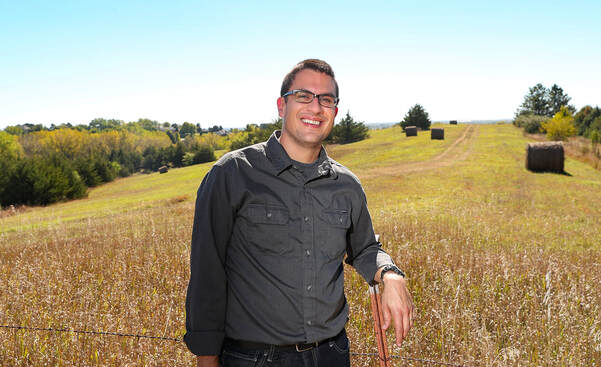 August 10, 2022 Tyler Ellyson Post Views: 1,430 KEARNEY – University of Nebraska at Kearney faculty member David Vail has been given the prestigious James C. Giesen Teaching Excellence Award in Agricultural and Rural History. An employee at UNK since 2016, Vail was recognized at the Agricultural History Society’s recent meeting in Stavanger, Norway. An associate professor of history, Vail’s specializations include environmental and agricultural history, public history and history of science, technology and medicine. Vail was recognized for his “innovative approach” to teaching and “transformational impact” on students at UNK. In his undergraduate courses, he engages his “student-colleagues,” as he calls them, in substantive research using physical objects and digitized collections that he has curated, including a collection of crop-dusting publications. “Whether he is teaching a course on the history of science and medicine, or a survey of U.S. history, he weaves urgent questions about the connection between land use, chemical applications and human health into his teaching,” the selection committee said when honoring Vail. Using what he calls the “collective wisdom model,” Vail organizes students into teams to research topics in a way that maximizes their analytical approach by drawing together their individual strengths. “On the graduate level, he not only engages students in critical reflection on the readings through author visits but also encourages the teachers in his courses to consider how they might further incorporate agricultural history into their lesson plans,” said the committee. “Beyond engaging students in critical analysis of the agricultural past and present, Vail has established himself as an attentive mentor who is invested in the academic as well as emotional well-being of his students, many of whom are the first generation in their families to attend college.” UNK graduate student Megan Launchbaugh added: “As a lifelong resident of an agricultural community, this course (Readings in Agricultural History) deepened my appreciation for the complexity of the relationship between people and the land, and the diversity of influence that exists within that relationship.” By TYLER ELLYSON UNK Communications http://unknews.unk.edu/2020/06/12/unk-history-professor-uses-past-pandemics-to-help-people-understand-covid-19/ KEARNEY – The ongoing coronavirus pandemic will undoubtedly be remembered as one of the most significant events of the 21st century. COVID-19, the disease caused by the novel coronavirus, has infected about 7.5 million people worldwide and killed more than 420,000, according to Johns Hopkins University. And those numbers continue to rise. The global outbreak has crippled economies, closed schools, shut down sporting events and impacted nearly every aspect of our day-to-day lives. It’s clear we are living through history. But it’s not the first time Americans have faced this level of fear and uncertainty. University of Nebraska at Kearney associate history professor David Vail believes lessons from the past can help put the coronavirus pandemic into perspective. “History provides really important tools to help us understand and begin to address current problems,” Vail said. “It gives us context to see where we need to go moving forward.” Vail teaches an undergraduate history of science and medicine course each semester. His students happened to be studying disease outbreaks when the coronavirus reached Nebraska. “One of the things we’re learning about pandemics is we have to be proactive,” he said. Following this advice, Vail met with his students in early March and included them in the planning process before moving the course online for the remainder of the spring semester. Although they were meeting remotely, Vail made sure there were opportunities for collaborative projects and group discussions, allowing students to learn from each other and better process what they’re currently experiencing. “We all got to discuss what it’s like to live through this together,” Vail said. Campus resources played a key role in this process, too. “UNK’s Special Collections and Archives, as well as the G.W. Frank Museum of History and Culture, had numerous historical materials for students to draw on,” Vail said, “and the results were amazing.” Responding to increased student interest in the topic, Vail also created a history of global pandemics summer course that started this week. The online course for graduate students takes an in-depth look at how diseases have shaped global societies. “In addition to helping our graduate students explore the historical context of the current pandemic, David’s course displays the ability of our department and its faculty to offer relevant courses on short notice,” said Jeff Wells, chair of UNK’s Department of History. Connecting the past and present can help people navigate the current situation. Vail said there are many similarities, and differences, between the COVID-19 outbreak and previous global pandemics, and we can learn from the things that went right and wrong. In early April, he joined KRVN Radio’s Brandon Benitz for a two-part interview on the history of global pandemics, with a focus on the 1918-19 Spanish flu that infected an estimated 500 million people and caused at least 50 million deaths worldwide. “One of the most important parts of being a historian is to connect the history we teach and share the expertise we have with the general public,” said Vail, who is also featured in a monthly agricultural history report on KRVN. By gaining this background knowledge, Vail said people can better understand viruses, vaccines and the policies put in place to protect the public. For instance, debates over when to remove quarantine and social distancing measures – similar to those happening now – also occurred in 1918. Public health officials in the U.S. and elsewhere are also concerned about a second wave of COVID-19 this fall. The Spanish flu came in multiple waves, including a more deadly second wave likely caused by a mutated virus spread by wartime troop movements. Eased restrictions on community events also contributed to the flu’s impact in fall 1918, according to Vail. “It’s important to have that historical context,” he said. “That’s not to say historians are fortune-tellers, but I think it does help to understand where these tensions come from and how people in the past dealt with them.” Ultimately, Vail said, one of the best ways to defeat any disease is to get people working with each other, for each other. 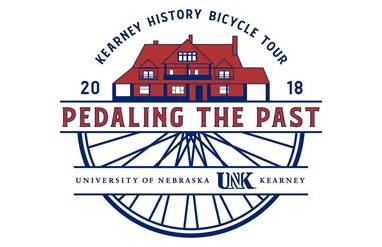 Join UNK historians, Will Stoutamire (Frank Museum) and David Vail (History), for a cycling tour through Kearney's rich history! Learn more about Kearney's early growth and the story behind the Kearney Canal during this leisurely, family-friendly ride on the city's popular hike/bike trail - from Yanney Park to Cottonmill and back. Tour Dates & Times: Saturday, September 22, 9am-Noon Sunday, September 30, 1pm-4pm Saturday, October 13, 9am-Noon Tours are FREE and open to the public. Limited to 30 maximum cyclists. Each participant will also receive a souvenir T-shirt. For more information: https://unknews.unk.edu/2018/08/30/explore-kearneys-past-on-bicycle-ride-with-unk-historians/ Sponsored by Humanities Nebraska and the Nebraska Cultural Endowment. Great Plains Book of the Month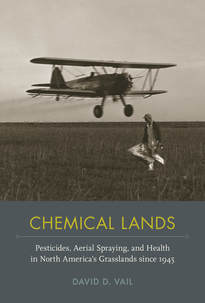 Each month the Center for Great Plains Studies features one book as its "Great Plains Book of the Month." We carefully choose books that are accessible and on topics of interest and importance for our region. They may be on any subject, of any genre, published within the last couple of years; occasionally we may feature a book published by or written at the Center. Mainly we want to bring attention to what we consider exceptional works both to learn from and enjoy. June Book of the Month Chemical Lands: Pesticides, Aerial Spraying, and Health in North America's Grasslands Since 1945 By David Vail Details: Agriculture, Pollution, Environmentalism Publisher: University of Alabama Press, 2018 David D. Vail provides a distinctly regional view of agricultural health with his insightful analysis of the deployment of insecticides and herbicides on the North American grasslands. He argues that practitioners designed local scientific experiments, engineered more precise aircraft sprayers, tried to develop narrowly specific chemicals, and planted targeted test crops in their efforts to link the science of toxicology with environmental health. "In Chemical Lands, David Vail incisively documents the complex relationship between sprayers, pesticides, herbicides, and grassland landscapes in America and Canada. For the first time, we can appreciate what was happening on the ground and in the sky through this thoughtful analysis of the sprayer’s perspective on the toxic chemicals that became intrinsic to American agriculture” -- Frederick Rowe Davis, author of Banned: A History of Pesticides and the Science of Toxicology Readers may also be interested - Vail, D. D. (2018). Farming by Rail: Demonstration Trains and the Rise of Mobile Agricultural Science in the Great Plains. Great Plains Quarterly, 38(2), 151-174. 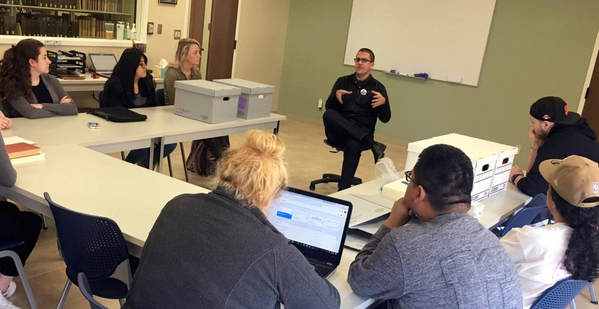 David Vail, assistant professor of environmental and agricultural history at the University of Nebraska at Kearney, visited the Illinois College campus on March 19-24, as part of a grant to bring humanities scholars to IC. While at Illinois College, Vail conducted research on Paul Findley ’43 and the former Congressman’s work with agriculture in Congress during the Cold War. Vail’s research utilized resources housed within the Khalaf Al Habtoor Archives, as well as the Paul Findley Congressional Office Museum. History and political science major Joe Ritter ’18 met with Vail during his visit and interviewed him about his work and the opportunities he sees for students entering the workforce today. "Dr. Vail told me about current trends in his field. He also shared with me insight about where to continue with my career in public history. His advice allowed me think about new ways to apply the skills I have learned in the classroom and working in the archives to my job search and future career." Vail’s background made him a great resource of information for Ritter and the other students he met with on campus. The experience is one of many offered for students through IC’s new public history program, which prepares students for graduate programs and career in archives, museums, historical sites, government agencies, libraries and a variety of other fields. Vail’s areas of specialization include environmental and agricultural history, science and technology, the Great Plains and public history. He has published several articles in academic journals on these topics and recently published a book on his research, “Chemical Lands: Pesticides, Aerial Spraying, and Health in North America’s Grasslands since 1945.” During his visit, Vail made a special presentation as part of Illinois College’s celebration of National Agriculture Month entitled, “Learning from the Noxious Ones: Agricultural Health and Aerial Spraying in the Great Plains,” on March 21. He discussed the methods and challenges of studying the long relationship between pesticides and health in the Great Plains. Visiting humanities scholars come to the College through an endowed fund established by a $200,000 Challenge Grant from the National Endowment for the Humanities and donors’ matching contributions. Vail is the second scholar to visit the college through this grant since May 2017. Samantha Sauer, assistant professor of history and Khalaf Al Habtoor archivist at IC, plans to document each scholar’s visit. She said that having the scholars on campus presents an exciting opportunity for students to gain a deeper understanding of their studies. For more information on the visiting scholars program, contact Samantha Sauer at [email protected]. 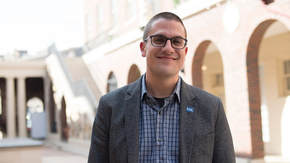 David Vail, assistant professor of history, proves it is possible to know your passions at an early age—and find the job that reminds you daily why you love what you do. Dr. Vail joined the Department of History at the University of Nebraska at Kearney (UNK) in 2016. He specializes in environmental history, history of science and technology, agricultural history, and assists his department with public history. We sat down with Dr. Vail, who teaches courses both on campus and online, to learn more about his story. What led you to become a history professor? I've loved history most of my life, and I also really enjoyed teaching. Around grade school, I knew that this was what I wanted to do with my life, so I earned my bachelor’s, master’s, and Ph.D. all in history. I'm originally from Oregon, so spending time outdoors and thinking about the history of landscapes, the history of ecosystems, and going to national parks encouraged a sense of the past that I realized informs almost everything that I do now—teaching that and researching it. I also enjoy agricultural history, though I didn't grow up on a farm, which everyone is curious about. I started piecing all these things together when I was younger, and that passion has remained with me. How can your areas of expertise in history be applied today? Environmental history or the histories of science and technology have real application in STEM fields and not just in humanities fields. Engineers or people going into the corporate side of life can really draw from a past that gives them a sense of understanding about their field. History enhances critical thinking skills and a sense of civic knowledge. For example, are technologies useful or can they be problematic? What were the roles of early practitioners and pioneers of science, and how did that shape space exploration, for example, or the space program during the 1960s? There is also so much in the history of food and rural communities that matter—not just for people in Nebraska, but all over the country and the world. A daily understanding of where your past is and where things are going, and having a sense of civic engagement and usability of that is important. You see all these histories aligning. So I would say it’s important to be studying history in these contexts, and our department is really good at that. How would you describe your interaction with students? There are two things that I discovered about the relationships I have with students. One is they have a similar passion. They can be anywhere in the world, but certainly in the United States, and be part of our program. They have a passion for history, a passion for learning, a passion for critical thinking that is really powerful. I've taught a lot of students in a lot of different places, and they seem to be very passionate about those things here at UNK. Another thing I would say about my relationship with students is that I really have a heart for a teacher-scholar method. So I like to try and learn as much as I can from them, and hopefully they're learning from me. What’s the most interesting thing in your office? One of the most interesting things in my office is a first edition and first printing of Rachel Carson’s “Silent Spring.” Rachel Carson was a biological scientist who wrote this book on the dangers and risks of pesticides, and DDT especially, in 1962. It was a widely acclaimed book and highly controversial book. Just think about the overlap of a woman in a science profession in the 1960s, with the growth of environmentalism and agribusiness overlapping that—being able to write that book in that time, and the power it’s had. Finding a first edition of that book is a very powerful daily reminder of what I’m doing as a historian. Carson is one of my heroes, so that’s one of the things that I look to every day. Explore your passion through an online M.A. in History or online minor in history at UNK. http://www.unk.edu/blog/2017/10/a-heart-for-teaching-history.php 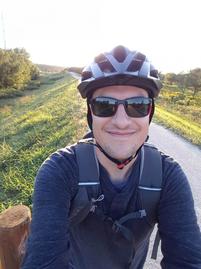 Adventure Great Plains: How Mountain Biking the Great Plains taught me to love the region’s history, its landscapes, and its peoples. By David Vail, Assistant Professor of History, University of Nebraska Kearney I love the Great Plains, although I’m not originally from here. I grew up in Southern Oregon’s Rogue Valley where outdoor learning and adventures were part of everyday life. Mountain biking connected my passion for the outdoors and exercise, but it also taught me about interconnectedness. Relationships between wildlife, landscapes, development, and local communities all came into view as I rode the trails. I learned at an early age about the challenges, tensions, and benefits of using landscapes. As I followed my passions for environmental and agricultural history to the grasslands, first to Kansas State University for my doctorate work and then, to UNK, I found a new joy in teaching, researching, and traversing the grasslands. Kansas’ Flint Hills offered a wealth of trails, beautiful vistas, and bison. Although challenged in elevation, riding paved and gravel roads and dirt trails placed me in the middle of Great Plains life: wind-whipped grasses; scurries of red squirrels; hunting bobcats; occasional red fox; distant humming of agricultural airplanes spraying fields of wheat or corn. Riding the Great Plains also allowed me to have a more direct relationship with noxious weeds and pests. But poison ivy and loan-star ticks didn’t stop me. Then, at the end of a mountain biking day, the sunsets. To stop and see the sky and land meet in a beautiful array of colors renews my passion for the land even while I’m weary from the ride. My recent move to my dream job of teaching history at UNK has also led to new dreams about the beauty of Nebraska’s environment, agricultural landscape, and local communities. I am excited to ride Kearney and adventure beyond to other Nebraska places. Hope to see you out here. http://www.unl.edu/plains/we-heart-great-plains |
|

